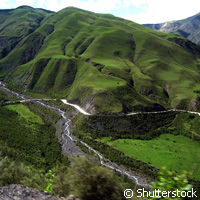Too much lithium in water triggers hypothyroidism
Hypothyroidism can be triggered by the ingestion of too much lithium via groundwater, new Swedish research shows. Lithium is used to treat bipolar disorder as well as treatment-resistant depression worldwide. But high concentrations of this element were found in villages of the Argentinean Andes mountains, where people treated for bipolar disorder exhibited altered thyroid function. The research, presented in the journal Environmental Health Perspectives, was funded in part by the PHIME ('Public health impact of long-term, low-level mixed element exposure in susceptible population strata') project, which clinched EUR 13.43 million under the 'Food quality and safety' Thematic area of the EU's Sixth Framework Programme (FP6). It is 1 of around 30 studies contributing to the PHIME objectives on the impact that toxic metals may have on several major diseases of great public health concern. Hypothyroidism is a metabolic disorder that triggers depression, fatigue, memory loss, weight gain and sensitivity to cold. For the purposes of this study, the researchers assessed women in a number of Puna Mountain villages. 'The amounts of lithium that the Latin American women are ingesting via their drinking water are perhaps a tenth of what a patient would take daily for bipolar disorder,' explains Dr Karin Broberg, an occupational and environmental physician at Lund University in Sweden, and lead author of the study. 'But, on the other hand, they are absorbing this lithium all their lives, even from before birth. What this implies for their health, we don't really know in practice. That is why we are planning a new study which will compare the health of two groups of mothers and children: respectively, the ones with the highest and lowest levels of lithium in their blood.' Experts say the Andes are home to many elements, and Bolivia has large lithium reserves in its salt desert, Salar de Uyuni. But not everything is positive about these elements, as they also pose a threat to the environment. Previous research spotlighting the Salta province in northwest Argentina found that high levels of lithium, arsenic, cesium, boron and rubidium were present in both the drinking water and urine of local women who participated in the study. 'Lifelong ingestion of arsenic and lithium brings a clear health risk,' Dr Broberg says. 'What the ingestion of the other substances implies is not known, because there is very little research on their role in ordinary drinking water,' she adds. Using mass spectrometry in their study, the scientists measured the content of many substances simultaneously, making it a much more effective method than conventional techniques that allow analysis of only one substance at a time. Dr Broberg is a proponent of using mass spectrometry to evaluate the water consumed by people. 'Groundwater has in many places been considered better to drink than the often polluted water from lakes and rivers,' she points out. 'But in Bangladesh this has caused enormous health problems, when it turned out that the water from drilled wells contained arsenic. Very little is known about the concentration of lithium and other potentially dangerous substances in the groundwater around the world, so this should also be measured.'For more information, please visit:Lund University:http://www.lunduniversity.lu.se/ Environmental Health Perspectives:http://ehp03.niehs.nih.gov/home.action
Countries
Argentina, Bolivia, Sweden



